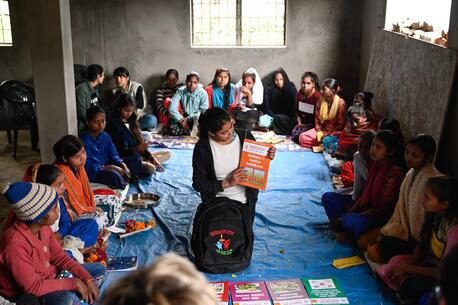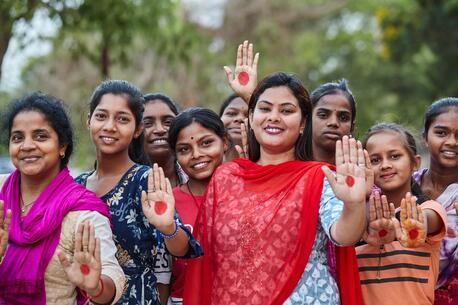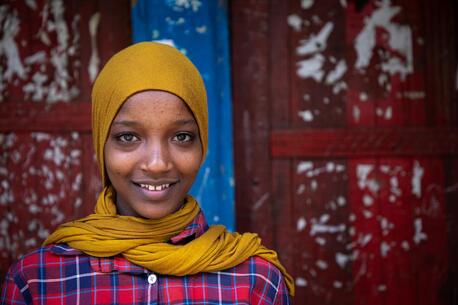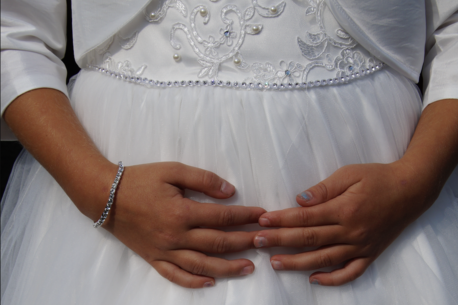
UNICEF and Zonta International Working to End Child Marriage in Nepal
More than 600 million women and girls alive today were married in childhood. Through partnership with UNICEF, Zonta International is working to protect girls from child marriage and ensure access to education and skills training so they can reach their full potential.
Child marriage is an internationally recognized human rights violation
Marriage before age 18 robs girls of their childhood and threatens their well-being. Since 2018, Zonta International has provided critical support for the Global Programme to End Child Marriage (GPEM), a joint initiative between UNICEF and the United Nations Population Fund (UNFPA) that promotes the rights of adolescent girls to prevent child marriage and pregnancy, and enables them to achieve their aspirations through education and pathways to self-sufficiency.
The GPEM empowers girls to direct their own futures and strengthens the services that allow them to do so, providing critical resources related to sexual and reproductive health and social protection. It also addresses the underlying conditions that sustain child marriage, advocating for data-informed laws and policies that protect girls' rights.
Every girl has the right to a safe and healthy childhood
Nearly half of the world's child brides live in South Asia (45 percent), with the next largest share in sub-Saharan Africa (20 percent), followed by East Asia and the Pacific (15 percent) and Latin America and the Caribbean (9 percent).
The GPEM focuses efforts on 12 of the most high-prevalence countries: Bangladesh, Burkina Faso, Ethiopia, Ghana, India, Mozambique, Nepal, Niger, Sierra Leone, Uganda, Yemen and Zambia.
In Nepal, teenage marriages and pregnancies are widespread
Nepal's child marriage rate is one of the highest in the world. Child marriage has affected 5 million child brides there, including 1.3 million who are married before the age of 15. Recognizing the pressing need to address this issue, the Government of Nepal raised the legal age of marriage for women and men to 20 in 2017, and has pledged to end child marriage by 2030. Despite progress, teen marriage and pregnancy remain a pressing problem, especially in marginalized communities.
The GPEM has helped establish community-focused, culturally sensitive programming to provide women and girls in Nepal with comprehensive life skills training needed to address and prevent marriage at an early age.
The Rupantaran program teaches young girls valuable life skills
On a recent visit to Nepal, Zonta leadership and members experienced the impact of this programming on girls and women firsthand.
Taught at schools and through women's cooperatives, the Rupantaran program aims to provide adolescents between 10 and 19 with the information and skills they need to navigate society and plan for their future. "To see the faces of the girls — the bright, shining eyes and the hope they expressed — I think that was heartwarming and touching, and these are pictures I will never forget," said Zonta International President Ute Scholtz. Watch the video
Students examine gender stereotypes and learn how to chart their own course
Developed by UNICEF and UNFPA in collaboration with the Government of Nepal, and implemented with support from partners including Zonta, Rupantaran's comprehensive curriculum teaches girls to build social and financial skills, examine gender stereotypes and achieve self-sufficiency.
"In Rupantaran,we learned a lot about child marriage," said 17-year-old Anjani. "We learned that when marriage happens before the age of 20, that is child marriage. Child marriage causes us a lot of harm. Becoming pregnant and birth at a young age can cause a lot of physical issues. Taking care of small children when you're young is difficult too."
Child marriage causes us a lot of harm. — Anjani, 17
Rupantaran graduate Rachana Lamsal, 18, was selected by her school to take the 10-day facilitators' training. "I loved it from the very first day," she said. "Of all the things I learned during the training, the component of self-awareness is the one that resonates the most with me. It’s so important to be self-aware to achieve anything in life; it’s what drives your commitment to a cause.
"I feel it’s not enough for me to have learned something, it needs to be shared with others around me, people in my society," she continued. "Child marriage must be uprooted because it damages the lives of girls. I want to use my training to uplift the lives of other young girls like me, as well as continue building my own skills. I want to do the best I can to solve these problems at a global level. That’s my dream.”
Learn more about UNICEF's long-standing partnership with Zonta International.
HOW TO HELP
There are many ways to make a difference
War, famine, poverty, natural disasters — threats to the world's children keep coming. But UNICEF won't stop working to keep children healthy and safe.
UNICEF works in over 190 countries and territories — more places than any other children's organization. UNICEF has the world's largest humanitarian warehouse and, when disaster strikes, can get supplies almost anywhere within 72 hours. Constantly innovating, always advocating for a better world for children, UNICEF works to ensure that every child can grow up healthy, educated, protected and respected.
Would you like to help give all children the opportunity to reach their full potential? There are many ways to get involved.





